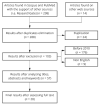Flexibility during the COVID-19 Pandemic Response: Healthcare Facility Assessment Tools for Resilient Evaluation
- PMID: 34769993
- PMCID: PMC8583089
- DOI: 10.3390/ijerph182111478
Flexibility during the COVID-19 Pandemic Response: Healthcare Facility Assessment Tools for Resilient Evaluation
Abstract
Healthcare facilities are facing huge challenges due to the outbreak of COVID-19. Around the world, national healthcare contingency plans have struggled to cope with the population health impact of COVID-19, with healthcare facilities and critical care systems buckling under the extraordinary pressures. COVID-19 has starkly highlighted the lack of reliable operational tools for assessing the level sof flexibility of a hospital building to support strategic and agile decision making. The aim of this study was to modify, improve and test an existing assessment tool for evaluating hospital facilities flexibility and resilience. We followed a five-step process for collecting data by (i) doing a literature review about flexibility principles and strategies, (ii) reviewing healthcare design guidelines, (iii) examining international healthcare facilities case studies, (iv) conducting a critical review and optimization of the existing tool, and (v) assessing the usability of the evaluation tool. The new version of the OFAT framework (Optimized Flexibility Assessment Tool) is composed of nine evaluation parameters and subdivided into measurable variables with scores ranging from 0 to 10. The pilot testing of case studies enabled the assessment and verification the OFAT validity and reliability in support of decision makers in addressing flexibility of hospital design and/or operations. Healthcare buildings need to be designed and built based on principles of flexibility to accommodate current healthcare operations, adapting to time-sensitive physical transformations and responding to contemporary and future public health emergencies.
Keywords: COVID-19; assessment tool; evaluation; flexibility; healthcare facilities; hospitals.
Conflict of interest statement
The authors declare no conflict of interest.
Figures




References
-
- Razzini K., Castrica M., Menchetti L., Maggi L., Negroni L., Orfeo N.V., Pizzoccheri A., Stocco M., Muttini S., Balzaretti C.M. SARS-CoV-2 RNA Detection in the Air and on Surfaces in the COVID-19 Ward of a Hospital in Milan, Italy. Sci. Total Environ. 2020;742 doi: 10.1016/j.scitotenv.2020.140540. - DOI - PMC - PubMed
-
- Houghton C., Meskell P., Delaney H., Smalle M., Glenton C., Booth A., Chan X.H.S., Devane D., Biesty L.M. Barriers and Facilitators to Healthcare Workers’ Adherence with Infection Prevention and Control (IPC) Guidelines for Respiratory Infectious Diseases: A Rapid Qualitative Evidence Synthesis. Cochrane Database Syst. Rev. 2020;4:1–55. - PMC - PubMed
Publication types
MeSH terms
LinkOut - more resources
Full Text Sources
Medical

